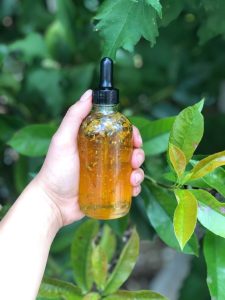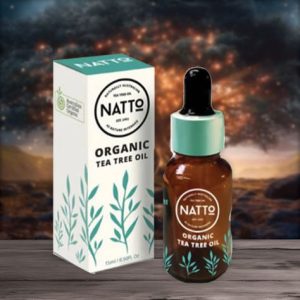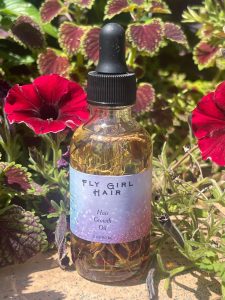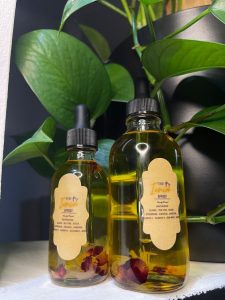
Tea tree oil, also known as melaleuca oil, is an essential oil derived from the leaves of the Melaleuca alternifolia tree native to Australia. Tea tree oil has a long history of medicinal uses. In recent years, it has gained popularity as a natural hair care remedy.
However, there is limited scientific research on the effectiveness and safety of tea tree oil for hair. While some studies suggest potential benefits, more research is needed. This article explores the potential benefits and drawbacks of using tea tree oil for hair care.
Potential Benefits of Tea Tree Oil for Hair
Tea tree oil has antimicrobial and antifungal properties. These properties might be beneficial for scalp conditions such as dandruff and scalp acne.
Here’s a closer look at the benefits:
Dandruff Relief:
Dandruff is caused by an overgrowth of Malassezia, a fungus that naturally occurs on the scalp. Tea tree oil’s antifungal properties may help reduce dandruff flaking and scalp itchiness.
Scalp Soothing:
Tea tree oil’s anti-inflammatory properties may help soothe a dry, itchy scalp.

Drawbacks and Safety Considerations of Tea Tree Oil
Tea tree oil is a potent substance and can irritate the skin. It is important to dilute tea tree oil before applying it to the scalp. Here are some safety precautions to consider:
- Never apply tea tree oil directly to the scalp. Dilute it with a carrier oil, like jojoba oil or almond oil, before use. A common dilution ratio is 2-3 drops of tea tree oil to 1 teaspoon of carrier oil.
- Patch test before use. Apply a small amount of the diluted tea tree oil mixture to your inner arm and wait 24 hours. If there is no redness or irritation, it should be safe to use on your scalp.
- Discontinue use if you experience irritation. If you experience scalp irritation, redness, or burning after using hair oil, discontinue use and wash your scalp with shampoo.
How to Use Tea Tree Oil for Hair
If you decide to use tea tree oil for your hair, dilute it properly and follow these steps:
- Shampoo and condition your hair as usual.
- Mix a few drops of diluted tea tree oil into your shampoo or conditioner.
- **Gently massage the mixture into your scalp for a few minutes.
- Rinse your hair thoroughly.
Alternatively, you can add a few drops of diluted tea tree oil to a scalp oil and massage it directly onto your scalp. Leave it on for 15 minutes before shampooing.
Tea tree oil should not be used on hair every day. Start with once or twice a week and see how your scalp reacts.
Other Natural Hair Care Options
Tea tree oil is not a magic cure for hair problems. There are many other natural hair care options available. Here are a few suggestions:
- Apple Cider Vinegar Rinse: Diluted apple cider vinegar can help balance scalp pH and add shine to hair.
- Aloe Vera: Aloe vera is a natural moisturizer that can soothe a dry scalp.
- Healthy Diet and Hydration: Maintaining a healthy diet and drinking plenty of water can promote overall hair health.
If you are considering using tea tree oil for your hair, it is important to weigh the potential benefits and drawbacks. Always dilute tea tree oil before using it and patch test first. If you have any scalp conditions, consult a dermatologist before using tea tree oil.
Tea tree oil may offer some benefits for hair health, but more research is needed. There are many other natural hair care options available. Explore these options and find what works best for your hair.

Additional Considerations for Tea Tree Oil
While tea tree oil has potential benefits for hair, there are other factors to consider:
-
Limited Research: As mentioned before, there is limited scientific research on the effectiveness of tea tree oil for hair care. More studies are needed to confirm its benefits and safety for long-term use.
-
Scalp Sensitivity: Tea tree oil, even when diluted, can irritate the scalp, especially for those with sensitive skin. Patch testing is crucial to avoid irritation.
-
Sustainability: The production of tea tree oil can have environmental impacts. Look for tea tree oil products with sustainability certifications if you choose to use them.
Alternatives to Tea Tree Oil
There are many other natural options for hair care that may be gentler and have more research behind them. Here are a few examples:
-
Carrier Oils: Carrier oils like jojoba oil, coconut oil, and argan oil can moisturize the scalp and hair.
-
Aloe Vera: Aloe vera gel can soothe a dry, itchy scalp and promote healing.
-
Apple Cider Vinegar Rinse: Diluted apple cider vinegar can help balance scalp pH and add shine to hair.
-
Scalp Massage: Regular scalp massage can improve circulation and promote hair health.
Tea Tree Oil and Hair Loss
One potential benefit of hair oil for hair is that it might help with dandruff. Dandruff can sometimes lead to hair loss. However, more research is needed to confirm this benefit.
Here’s what we do know: dandruff is caused by an overgrowth of fungus on the scalp. Tea tree oil has antifungal properties. So, the theory is that tea tree oil can help reduce dandruff and potentially reduce hair loss associated with dandruff.
Finding the Right Hair Care Routine
If you’re looking to improve your hair health, a good first step is to focus on a well-rounded hair care routine. This includes using gentle shampoos and conditioners, avoiding tight hairstyles that can pull on hair, and maintaining a healthy diet.
For specific concerns about hair loss or scalp conditions, it’s always a good idea to consult a dermatologist. They can help diagnose the underlying cause and recommend treatment options.
Conclusion: Explore and Find What Works for You
Tea tree oil may offer some benefits for hair health, but it’s important to weigh the potential drawbacks and limited research. Explore other natural hair care options and find what works best for your hair type and scalp health.
Remember, a healthy diet, staying hydrated, and managing stress can all contribute to overall hair health. Consulting a dermatologist is always recommended if you have any concerns about your scalp or hair.








